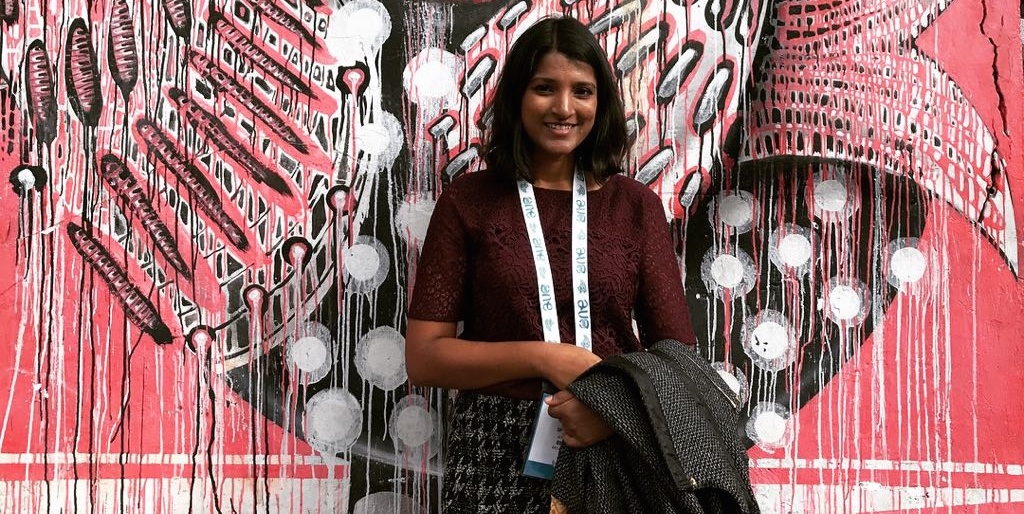Spadika Jayaraj graduated from law school in 2016, and was a core member of Quirk during her time here. She went on to join McKinsey, a global consulting firm, with whom she worked for 2 years before moving to a start-up. Quirk asked her to share with us some of her experiences working with McKinsey. This interview was conducted by Radhika Goyal (Batch of 2019).
Hi Spadika, tell us a little bit about your time in Law School. What committees were you a part of, what kind of activities were you interested in, and what did you prioritise?
Law School, in hindsight, was a period of big transformation. I suppose it’s the same for all of us. In my first year, I tried my hand at debating, and was part of the Literary and Debating society. From my second year onwards, I became actively involved with LSC and IDIA- I also headed the IDIA chapter in my final 2 years. ‘Social work’ therefore ended up becoming a big part of my five years in law school. I became almost obsessed with the ideas of diversity and inclusion. One of the best uses of my time in fifth year was being part of the team that worked on the NLS Diversity Census. Apart from social impact related work, I was also interested in Intellectual Property law, so I ended up writing for SpicyIP and helped Professor Shamnad Basheer as a research assistant for a couple of his books and articles. I was also a part of Quirk in my final year, in the time it moved from the print edition to online. Shout out to your team – Quirk today continues to be my strongest link to law school! 🙂 I also dabbled with mooting, did a couple of moots and participated in the Jean Pictet competition that took place in France during my year.
As a consequence of juggling all these activities, maintaining a decent CGPA and not giving up on afternoon naps (EVER), I’d say the one thing I missed out on was involving myself more in the law school fests. I saw my friends form some of their strongest bonds and have some of their most memorable experiences over SF, Spiritus, etc. If I could go back and do law school all over again, that’s the one thing I would change.
It’s now been 2 years since you graduated law school. What have you been doing since then?
I was a Business Analyst at McKinsey and Company for 2 years, before the startup bug bit me- I now work at an early stage startup called Kaleidofin, that focuses on financial inclusion in the informal economy.
Was choosing an alternative career a difficult choice to make, given the importance of corp jobs especially around 4th year in Law School?
I was always conflicted about whether I wanted a corporate law career, or even a career in law at all. While I had loved my time in Law School, I didn’t catch a fancy for any legal career. In 4th year, I managed to escape the corp law peer pressure by doing an exchange program in Sweden. However, when I came back, I bit the bullet and did a corporate law internship. I also interviewed for the PPO, and when I did not receive one, I sat down and seriously thought about why I was half-heartedly pursuing something I knew I would not enjoy. I realised that while I loved Law School, I was a lot more passionate about social impact than about the law itself.
I then decided not to sit for Day 0 at all, because I knew that if I did sit, it would be too difficult to later turn down such a cushy, ‘prestigious’, well paying job. I think the best thing the NLS degree gives you is a safety net- I knew that if nothing else works out, I could go back and get a job at a smaller corporate law firm, or a litigation chamber. This gave me the freedom to hold out and soul search. When I heard that McKinsey was going to recruit, I spoke to a couple of seniors who worked there, and did a bit of research. McKinsey sounded perfect- two years of doing a variety of work to figure out what you really like. It’s also a great brand to be associated with, to transition out of law. I decided to apply, and was elated when I got the offer.
How do you feel about not working with the law per se, which is a concern many people in law school have about alternative careers?
An ‘alternate career’, especially consulting, especially at McKinsey, throws the field wide open. Over the past 2 years, I have learnt of career options that I had no idea existed back in Law School. You could say that as far as alternate careers go, I have it pretty easy thanks to having worked in consulting. But even if you don’t, if you have a bit of hustle, it can be really rewarding! One thing I’ve noticed about the typical law schoolite (who goes into litigation or a law firm) is that they are unlikely to make a single non-lawyer friend after entering law school. That’s quite limiting, if you think about it. An alternate career, even if just for a couple of years, can (re)open your eyes to the rest of the world. And thanks to the great Law School network- if you don’t like the non-law world, remember that you can always go back to law. 2 years in, I see vacancies in law firms pop up almost every week on the batch Whatsapp group.
Therefore, I do think that trying out a non-law job right out of law school is one of the least risky, and most rewarding things you can do.
That said, continuing on in a non-law path is not always easy, for one main reason. The NLS network is extremely powerful, but its influence is largely limited to the legal world. When you compare yourself to, say, someone from a top IIT, whose alumni occupy top spots in pretty much all spheres of business, it can feel a bit lonely to be off the legal track as a Law Schoolite. Most of your typical ‘studly’ role models from college lose relevance to your goals (or to help figure out your goals), and it can be difficult to find mentors who share the same background as you. You may find that you do not have as much of a safety net outside law school. This is why I think choosing a reputed firm like McKinsey will help a lot, as the McK-network has the potential to really take you places.
What are the demands of a job in McKinsey? Do you think your education at law school has helped you with the job?
As a Business Analyst in McKinsey, you will work on different projects (called ‘studies’), each typically lasting 3-4 months. On each study, you will be part of a team working out of the client site, solving a business challenge they are facing. The challenges could be operational, like how to increase supply chain efficiency; or strategic, like what should be the 5 year plan of the company. Over my 2 years, I have worked out of an automotive plant, out of a government Ministry, spent a few months on the road in Tamil Nadu auditing loan applications, and out of a swanky corporate head office. Despite my atypical journey (I ended up spending >75% of my time in the financial services sector), I have tried my hand at a pretty crazy variety of work- something pretty much no other career than consulting can give you.
Work aside, McKinsey also pampers its new hires with a lot of opportunities for foreign travel. Even if you (like me) are not lucky enough to actually land a study abroad, you will have the chance to attend trainings and conferences in exotic locations, and people encourage you to take a few days off before/after to travel! The most interesting country that I did a work-sponsored trip to was Colombia. I am pretty sure that’s a corner of the world I would have never had a chance to visit otherwise. What’s more fantastic than the travel itself is the culture that enables it- the firm truly believes that happy people are the most productive.
My Law School knowledge did not help me in my job per se, other than enabling me to sound more knowledgeable about some topics (like Aadhaar, for example). However, the skill sets do come in use. Speed reading, critical analysis, structuring are things that we have been practicing for years. I think a big difference between law school training and engineering training is that Law School focuses on critical thinking, while engineering focuses on problem solving. I found it slightly challenging to shift to a problem-solving mindset initially, but in the long run, I think it’s a great combination to be comfortable with both– and consulting enables that.
What is the best / worst part of your job?
Consulting as a profession is structured in a way that true work/life balance is nearly impossible to achieve. Long work hours are the norm (although I would say it’s better than a Law Firm). The back and forth travel is exciting initially, but can wear you down over time. All that said, it’s a really exciting job- I have had multiple people tell me that my Instagram handle is super annoying thanks to all the travel- isn’t that the true sign of a life well-lived? 😉
What would be your piece of advice to someone looking to explore a career in consultancy?
A lot of Law Schoolites are hesitant about consulting because it’s unknown and everything about it seems alien. My advice is to embrace it. Nobody goes into consulting knowing what to expect- that’s part of the journey! The core skill you pick up is the ability to land in any situation and figure out what to do at lightning speed. There are enough examples of law schoolites who spent 2 years at Mckinsey, picked up these cool skills and went back to law (Arun Srikumar, founding partner at the law firm Keystone; Harini Vishwanathan, currently at Allen & Overy; Viraj Parikh and Vinodini Srinivasan, Associates at Keystone); there are also some great examples of people who charted interesting non-law career paths for themselves (Adithya Banavar, who does strategy at Spotify in New York, and Sarayu Natarajan who worked at an Impact Investing fund after McKinsey).A couple of people have also decided to stay on and climb the ladder at McKinsey itself- like Uttara and Divya Shenoy. The Business Analyst program used to be a 2 year program until a couple of years ago- now it’s a regular track, and everyone can choose to stay on after 2 years if they wish.
Do not fear that you will be left with no choices if you take up consulting after Law School- in fact, your problem will be that you will have too many choices. I had interviewed with venture capital funds, impact investing funds, and a philanthropic foundation before narrowing down on what I want to do.
Over the course of two years, I had found an area of interest in financial inclusion. This is something I would never have been exposed to had I taken up a legal job. I began scouring the space for opportunities, and once something clicked, I decided it was time to leave McKinsey. I now work closely with the founding team at Kaleidofin, helping underserved, low income communities gain access to financial services. I love being here, and am excited about what the future holds.


Comments